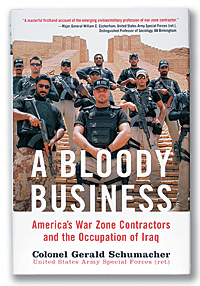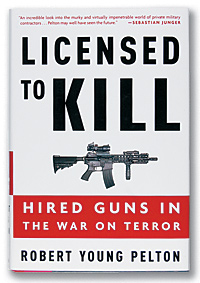Best Business Books: The Business of Defense
Chronicles of the “Dogs of War”
(originally published by Booz & Company) Colonel Gerald Schumacher,
Colonel Gerald Schumacher,
A Bloody Business: America’s War Zone Contractors and the Occupation of Iraq
(Zenith Press, 2006)
Robert Young Pelton,
Licensed to Kill: Hired Guns in the War on Terror
(Crown, 2006)
Christopher Kinsey,
Corporate Soldiers and International Security: The Rise of Private Military Companies
(Routledge, 2006)
In 1974, best-selling author Frederick Forsythe published the novel The Dogs of War, about mercenaries hired to overthrow the leadership of an African republic. Over the next quarter century, hired guns did indeed try to overthrow a number of African governments — generally at the behest of investors or foreign states. These attempts proved to be failures; one, involving arms sales that violated a United Nations embargo in Sierra Leone in 1998, was a disaster that almost brought down the British government. Ironically, the central figure in that episode, retired British Army Lieutenant Colonel Tim Spicer, later became head of a British firm that won the single largest American security contract in Iraq.
Today, mercenaries, as well as their far more respectable cousins, private military companies (PMCs), have become a fixture on the international stage. PMCs generally operate aboveboard, generally as extensions of the governments that have contracted for their services. Yet a good number of PMC employees who operate in the field, as well as the many firms and individuals that the prime contractors hire as subs, reflect a wild side that has variously been viewed as romantic and adventurous, or as simply dangerous. This year, in the context of war in the Middle East, but with the entire world as their backdrop, three new books have been published to portray and make sense of the “dogs of war.” Although they might not ordinarily be considered business books, they chronicle the rise and influence of one of the most significant forms of private enterprise today — and if for no other reason, this places them among the best business books of 2006.
 Growing Role
Growing Role
Gerald Schumacher, a retired Army Special Forces officer, dedicates A Bloody Business: America’s War Zone Contractors and the Occupation of Iraq to “the memory of Wolf Weiss, the consummate warrior.” But Mr. Weiss was no ordinary contractor earning his keep in Iraq. He was, instead, a former Marine and rock musician who made no bones about why he had gone to Iraq: “When you’re getting shot at and returning fire, it’s the same, regardless of who you’re working for — the adrenaline, the chaos, the sheer horror at times,” he told a reporter for Rolling Stone magazine. “There’s always a void to fill with me. I’m an adrenaline junkie of some kind.” That article was published in September 2004, two months before Mr. Weiss was killed in an ambush in Mosul on his way to drive two United States Embassy officials to Baghdad. Colonel Schumacher clearly admires the brave souls who escort supply convoys into Iraq from Kuwait, transport VIPs from one Iraqi locale to another, and provide security details for local Iraqi and American officials. Wolf Weiss is not his only hero: He also dedicates his book “to all the men and women who do not wear a uniform yet go into harm’s way to serve our country.”
 Like Colonel Schumacher, Robert Young Pelton — a journalist who traveled to both Iraq and Afghanistan to research Licensed to Kill: Hired Guns in the War on Terror — writes in a breathless style laced with clichés, buzzwords, and expletives. But in stark contrast to A Bloody Business, Mr. Pelton takes a dim view of Wolf Weiss and his ilk. He claims that the Rolling Stone article helped crystallize the image of private military contractors as bloodthirsty, gun-toting, hyped-up freaks terrorizing Iraqis. Perhaps. But the real question that readers need to consider with respect to private security contractors, whether in Iraq, Afghanistan, or elsewhere, is whether these organizations help countries that employ them win, or lose, the wars in which they become enmeshed.
Like Colonel Schumacher, Robert Young Pelton — a journalist who traveled to both Iraq and Afghanistan to research Licensed to Kill: Hired Guns in the War on Terror — writes in a breathless style laced with clichés, buzzwords, and expletives. But in stark contrast to A Bloody Business, Mr. Pelton takes a dim view of Wolf Weiss and his ilk. He claims that the Rolling Stone article helped crystallize the image of private military contractors as bloodthirsty, gun-toting, hyped-up freaks terrorizing Iraqis. Perhaps. But the real question that readers need to consider with respect to private security contractors, whether in Iraq, Afghanistan, or elsewhere, is whether these organizations help countries that employ them win, or lose, the wars in which they become enmeshed.
There can be little doubt about the growing role and importance of private security companies in both Iraq and Afghanistan. These companies provide what for centuries was termed “mercenaries” — soldiers for hire — as well as services that include combat support, service support, and private security details. Some of these companies, like the Blackwater Group, have enjoyed exceptional growth since September 11, 2001, and the launch of the “War on Terror.” Others, like DynCorp and Halliburton’s Kellogg Brown and Root subsidiary, have been longtime military contractors for the U.S. and other countries. Those two companies, for example, provided service support to American forces in the Balkan wars of the 1990s, under the Logistics Civil Augmentation Program (better known as LOGCAP). Still other private contractors, many of them with British and South African connections, have found work in Iraq and Afghanistan, but also have personnel who in the past took on shadier tasks, such as fomenting coups in impoverished African states.
With its ground forces stretched to the limit, and with the same personnel forced to redeploy to Iraq and Afghanistan on multiple occasions, the United States appears likely to continue to rely on private security companies for a variety of military-related tasks. It is certainly true that it is far more efficient for the American military, with its huge health-care and other personnel-related costs, to use these companies for a variety of service support functions. The logic behind this approach is at least as strong as the logic behind outsourcing for multinational corporations. Why should troops that might otherwise serve in combat roles be relegated to cleaning toilets, preparing food, doing laundry, or giving haircuts to their colleagues? Private companies perform these functions just as capably and at a lower cost (although that’s not all they do). For this reason alone, as Christopher Kinsey notes in his scholarly volume Corporate Soldiers and International Security: The Rise of Private Military Companies, private security firms are likely to remain a permanent part of the international landscape.
Professor Kinsey lectures at the Defence Studies Department of Kings College, London, and he brings to his volume a valuable breadth of perspective, taking in the entire course of European military history. The book also extends his previous arguments in a debate that has taken place in the U.K. since 1999 — indeed, since Tim Spicer’s misadventure in Sierra Leone — over whether military private contractors should be regulated, and if so, how. Corporate Soldiers and International Security argues that these private firms cannot, and will not, be banned; they simply are too essential and cost-effective. Yet, Professor Kinsey argues, these firms require some form of serious regulation (he advocates licensing and monitoring them), or else they will carry the risk that mercenaries have also carried, of transforming war beyond national, indeed international, control.
Many of these companies — and there are literally hundreds in Iraq alone, involving tens of thousands of individuals — may be as much a part of the problem as a part of the solution. Just as the nature of war has changed in recent years, all three books make clear that the nature of private military contracting has changed as well, especially as private firms provide services that bring them much closer to the line of fire. Many of these contractors are retired Special Forces types, and they retain the “snake eater” mentality that makes them eminently suitable for the jobs they have undertaken. Indeed, as Mr. Pelton illustrates, a number of retired special operators have found civilian life boring, and they jump at the opportunity to reexperience the thrills, risks, and glory of their youth. Others are misfits who try to find themselves in the blood and gore that is the daily fare of Iraq and Afghanistan. Still others are simply pragmatists with no better job possibilities, wanting to make some money to support their families. For members of those three groups, Colonel Schumacher provides a guide to finding a job with a private military contractor and lists the most likely employers, complete with contact numbers, in his book’s appendix.
Unregulated Warriors
PMC employees roaming around Iraq today must contend with kidnappings, hijackings, and the kind of ambush that eventually claimed the life of Wolf Weiss. When driving their vehicles, as convoy escorts or to protect individuals, they are subject to sniper fire, to remotely detonated improvised explosive devices, and to suicide bombers. Their lives are full of stress, danger, and suspicion of, and from, the locals.
Because these contractors are civilians, they are not guaranteed protection by Coalition military forces. Virtually all of the contractors are armed: When they are fired upon, or even when they merely think they will be fired upon, they can fire back. There are no records to indicate how many Iraqis have been killed or wounded by contractors, and very few contractors are held responsible for whatever death or injury they may cause. In Iraq, for example, U.S. Ambassador Paul Bremer, who headed the Coalition Provisional Authority in 2003–2004, extended immunity to all private contractors for their activities against Iraqis. Order 17, which remains in force, specifically excludes contractors “from Iraqi legal process with respect to acts performed by them pursuant to the terms and conditions of a contract or any subcontract thereto.” In other words, when a contractor fires at a suspicious-looking oncoming Iraqi car, no one will hold him (the overwhelming majority of contractors are men) to account. Except, of course, the extended family of the dead or injured. If they retaliate, then the danger and destructiveness of the entire situation escalates, as it in fact has over the past two years.
Public-sector military forces, by contrast, are subject to strict regulation. Before members of the U.S. military go to the Middle East, they are trained in the folkways of a culture and religion that would otherwise be completely alien to them. America’s contractors are not regulated. And it is anybody’s guess whether they are acculturating to their environment, or whether they even care to be, other than to keep themselves alive. Although some companies truly see themselves as representing the national interest, not all do, and certainly not those that are non-American subcontractors to American (or British) firms.
Questions of behavior come into play as Iraq sinks into civil war — at least if civil war is defined as the operation of militias on both sides. Thousands of Iraqis are dying, and their families are hungering for revenge. In this environment, the actions of contractors, subject to no accountability other than company regulations (which matter only if they work for a responsible company), may undermine U.S. prospects of achieving any degree of success in Iraq.
The situation in Afghanistan may not be much better. Mr. Pelton asserts, on the basis of his visits to the border areas between Pakistan and Afghanistan, that private contractors are carrying out quasi-military missions in the hunt for Osama bin Laden and the Taliban. He further claims that these missions are being conducted by companies and individuals under contract to agencies other than the Department of Defense precisely because of the “plausible deniability” factor. And he argues that the Afghans who work with these contractors are loyal only to the money they are paid and therefore always remain available to the highest bidder.
Contractors, notes Mr. Pelton, may not be as effective in realizing the military objectives of their employers. Many of the contractors involved in Afghanistan, for instance, are former Special Forces operatives. Some of them — though by no means all — exhibit the character traits that made Wolf Weiss a Rolling Stone star. Afghanistan’s topography and the sheer viciousness of its “bad guys” can make the situation in Iraq look tame. Yet only three years ago, Afghanistan appeared to be on the road to reconstruction. What has happened since that time? In no small measure, U.S. leaders shifted their focus to Iraq, leaving Afghanistan to NATO, the U.N., NGOs, and a small American force. And because that force was small, and stretched, contractors came to the fore, doing jobs U.S. troops couldn’t or wouldn’t do.
In the main, American contractors have performed well in Afghanistan. And that country does not have the same degree of concern about freelancing, gun-toting individuals that marks discussions about Iraq. Yet there is real concern about the loyalties of Afghans who work with these contractors, as well as about the growing strength of the Taliban and, if Mr. Pelton is to be believed, its al Qaeda allies.
Mr. Pelton notes the similarities between Afghanistan and Vietnam; contractors were employed on secret missions in the earlier war as well. Vietnam was also the crucible for many of the retired military who form the bulk of in-theater contractor support for U.S. and Coalition forces in Iraq. Those who argue for expanding the role of contractors in military operations — some would even have them replace U.N. peacekeeping forces — speak not only of the economies and efficiencies that would result from their employment, but also of the far greater effectiveness that battle-tested Western contractors would bring to their missions.
But contractors remain answerable first to their managers, second to their shareholders, and only third to their customers. In the case of individuals and closely held corporations, they are essentially their own shareholders. The prospects for an international regulatory regime, such as that which Professor Kinsey proposes, are not bright, at least in the short term. Will such contractors, therefore, be able to achieve the policy goals that nations seek above and beyond the battlefield? Or will their behavior, unregulated as it is, end up making those goals less achievable?
Finally, contractors may not even achieve their business objectives in the long run. Firms that get the reputation for making things worse may trigger regulatory and legal backlash (as they have in the United Kingdom) or simply lose their customers. Companies that are hired because they play fast and loose with the constraints of military ethics are more likely to play fast and loose with business principles as well — and may thus be less viable as long-term business enterprises.
Those who read these three books will come to an inescapable conclusion: No matter how capable military contractors might be when deployed in combat-related areas, they will not achieve the aims of the governments that hired them. To be sure, they will remain an important supplement to military forces, providing critical noncombat service support that would otherwise have to be performed by highly trained servicemen and servicewomen who are best employed in combat roles. But military contractors cannot act effectively as soldiers in the long run. Worse still, they may well undermine their clients’ military aims, because they will add to the resentments of those already embittered populations that view the United States as an alien occupier.
Despite the glory that Colonel Schumacher ascribes to such contractors, and the wealth that Professor Kinsey and Mr. Pelton claim they have earned, undermining military aims is exactly what they appear to be doing in Iraq, and perhaps in Afghanistan. When all is said and done, the political and strategic consequences of their activities in both countries are still unknown — and as has often been the case with mercenaries in the past, we will not be in a position to judge the results until it is too late to do anything about them.
All three books provide a valuable perspective on a business that is murky and misunderstood. Professor Kinsey’s stands out among the three for its academic rigor and clearly documented research. Nevertheless, for a combination of sheer readability and shrewd analysis, as well as valuable reportage, Mr. Pelton’s volume is the most compelling. It rightly claims its place as the best book on its subject in 2006.![]()
Author profile:
Dov S. Zakheim (zakheim_dov@bah.com) is a vice president with Booz Allen Hamilton based in McLean, Va. From 2001 to April 2004, he served as the under secretary of defense (comptroller) and chief financial officer for the United States Department of Defense (DoD). He has also been U.S. deputy under secretary of defense for planning and resources; a corporate vice president of System Planning Corporation; and an adjunct professor at the National War College, Yeshiva University, Columbia University, and Trinity College.


